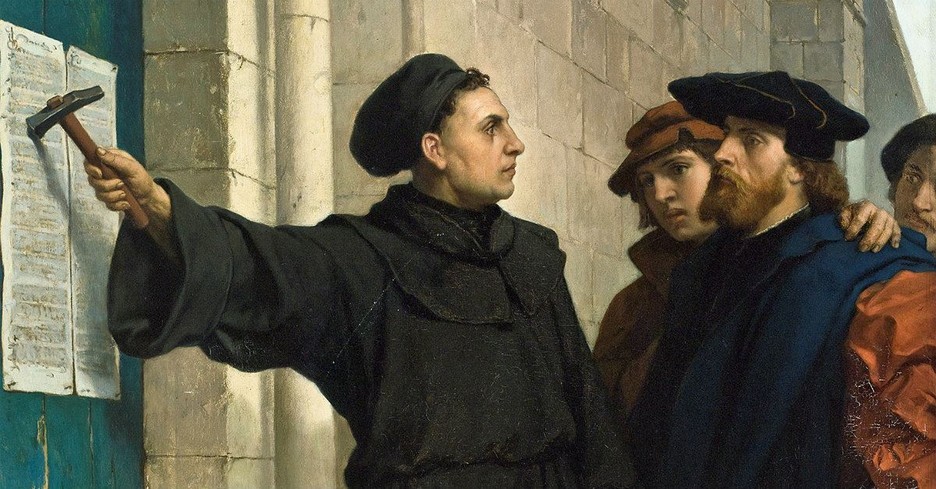
In the little town of Wittenberg, Germany, on this day, October 31, 1517, a priest nailed a challenge to debate on the church door. No one may have noticed then, but within the week, copies of his theses would be discussed throughout the surrounding regions; and within a decade, Europe itself was shaken by his simple act. Later generations would mark Martin Luther's nailing of the 95 theses on the church door as the beginning of the Protestant Reformation, but what did Luther think he was doing at the time? To answer this question, we need to understand a little about Luther's own spiritual journey.
Martin Luther
As a young man in Germany at the beginning of the sixteenth century, Luther was studying law at the university. One day he was caught in a storm and was almost killed by lightning. He cried out to St. Anne and promised God he would become a monk. In 1505, Luther entered the Augustinian monastery and in 1507 became a priest. His monastic leaders sent him to Rome in 1510, but Luther was disenchanted with the ritualism and dead faith he found in the papal city. There was nothing in Rome to mend his despairing spirit or settle his restless soul. He seemed so cut off from God, and nowhere could he find a cure for his malady.
Martin Luther was bright, and his superiors soon had him teaching theology at the university. In 1515, he began teaching Paul's epistle to the Romans. Slowly, Paul's words in Romans began to break through the gloom of Luther's soul. Luther wrote
My situation was that, although an impeccable monk, I stood before God as a sinner troubled in conscience, and I had no confidence that my merit would assuage him. Night and day I pondered until I saw the connection between the justice of God and the statement 'the just shall live by faith.' Then I grasped that the justice of God is that righteousness by which through grace and sheer mercy God justifies us through faith. Thereupon I felt myself to be reborn and to have gone through open doors into paradise. The whole of Scripture took on a new meaning...This passage of Paul became to me a gate to heaven.
The more Luther's eyes were opened by his study of Romans, the more he saw the church's corruption in his day. The glorious truth of justification by faith alone had become buried under a mound of greed, corruption, and false teaching. Most galling was the practice of indulgences -- the certificates the church provided for a fee, supposedly to shorten one's stay in Purgatory. The pope was encouraging the sale of indulgences. He planned to use the money to help pay for the building of St. Peter's Basilica in Rome.
Johann Tetzel was one of the indulgence sellers in Luther's vicinity. He used little advertising jingles to encourage people to buy his wares: "As soon as the coin in the coffer rings, the soul from purgatory springs." Once Luther realized the sufficiency of Christ's sacrifice alone for our sins, he found such practices revolting. The more he studied the Scriptures, the more he saw the need to show the church how it had strayed from the truth.
Reason for the 95 Theses
So, on this day, October 31, 1517, he posted a list of 95 propositions on the church door in Wittenberg. In his day, this was the means of inviting scholars to debate important issues. No one took up Luther's challenge to debate at that time, but once news of his proposals became known, many began to discuss the issue Luther raised that salvation was by faith in Christ's work alone. Luther initially expected the Pope to agree with his position since it was based on Scripture, but in 1520, the Pope issued a decree condemning Luther's views. Luther publicly burned the papal decree. With that act, he also burned his bridges behind him.
Read the Full List of Luther's 95 Theses.
Photo Credit: WikimediaCommons
Bibliography:
- Adapted from an earlier Christian History Institute story.
- Bainton, Roland. Here I Stand. New York: Mentor, 1950.
- Durant, Will. The Reformation. New York: Simon and Schuster, 1957.
- Köstlin, Julius. Life of Luther. New York, C. Scribner's sons, 1884.
- Wells, Amos R. A Treasure of Hymns; Brief biographies of 120 leading hymn- writers and Their best hymns. Boston: W. A. Wilde company, 1945.
- Various encyclopedia articles.
Last updated July 2017.


